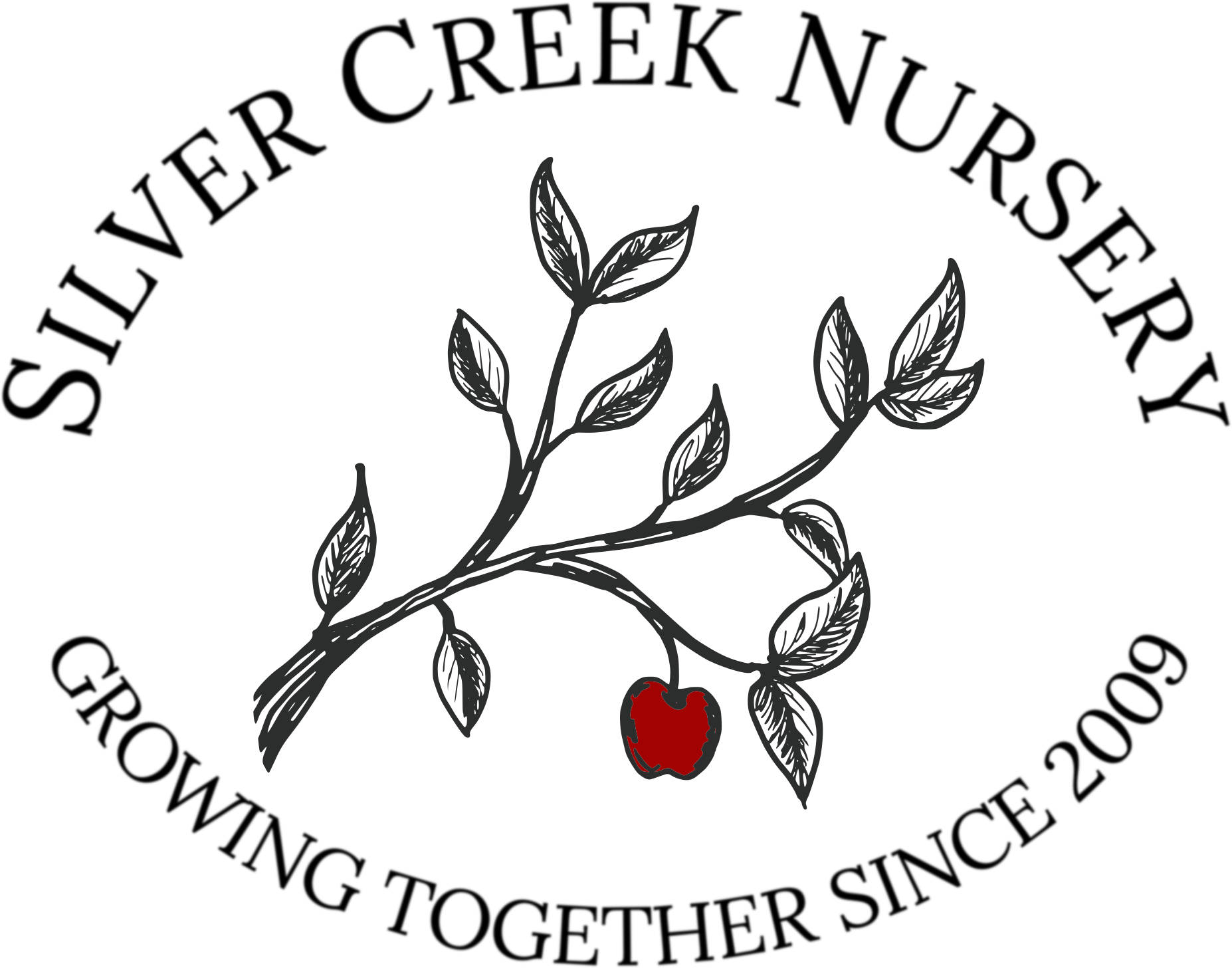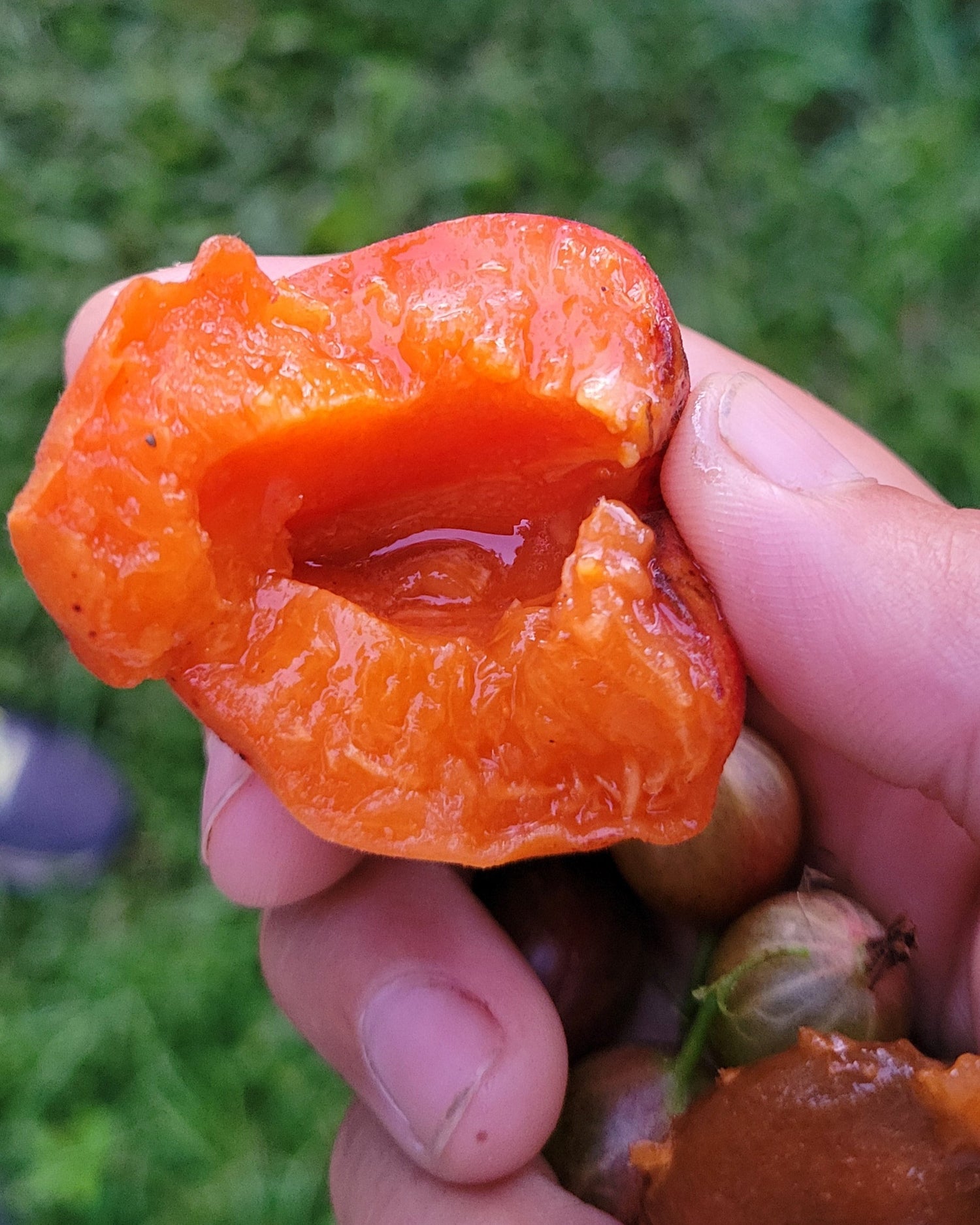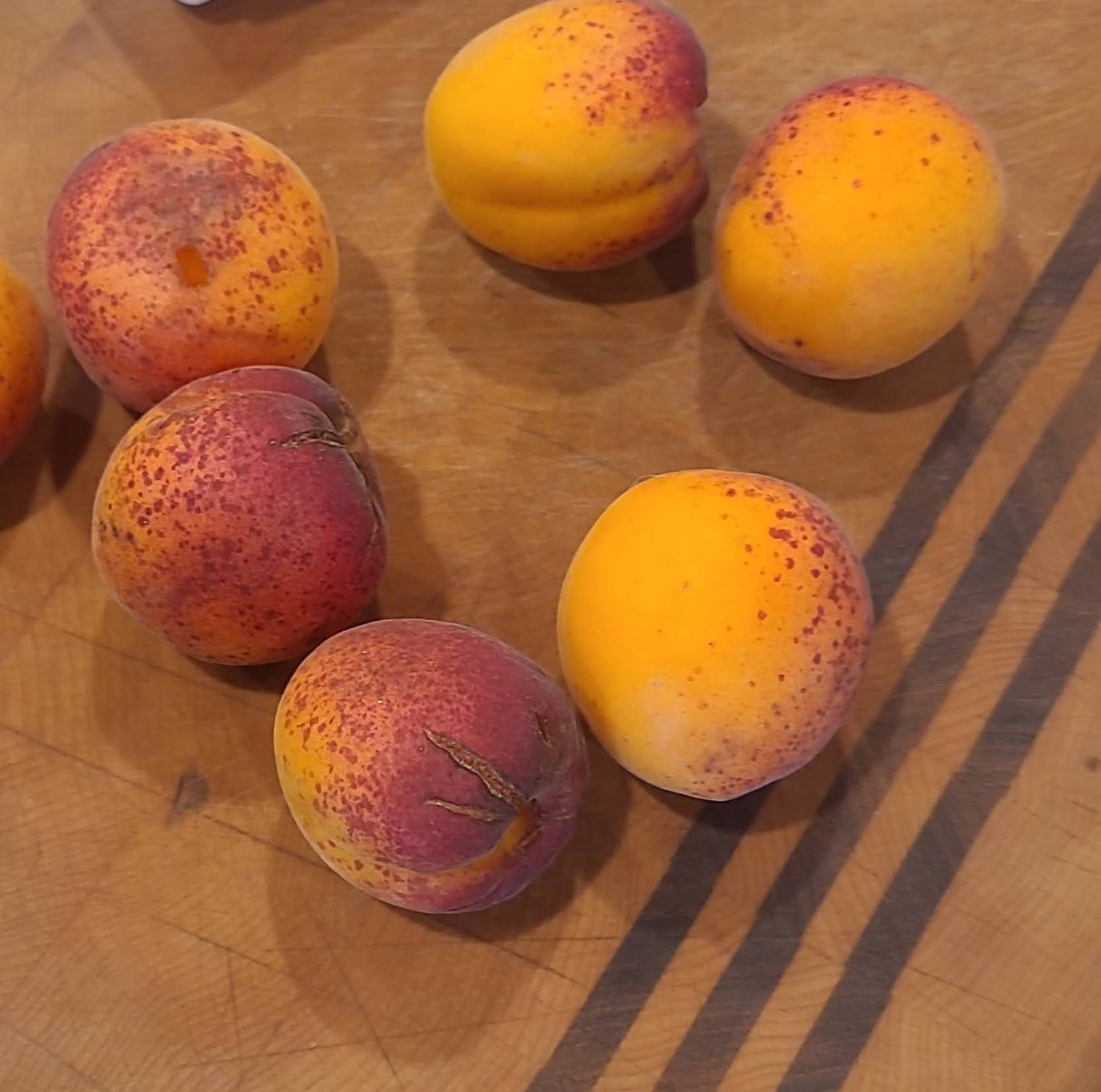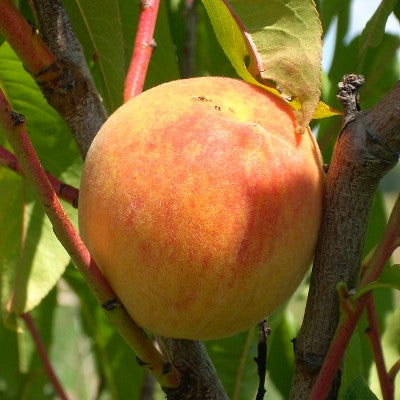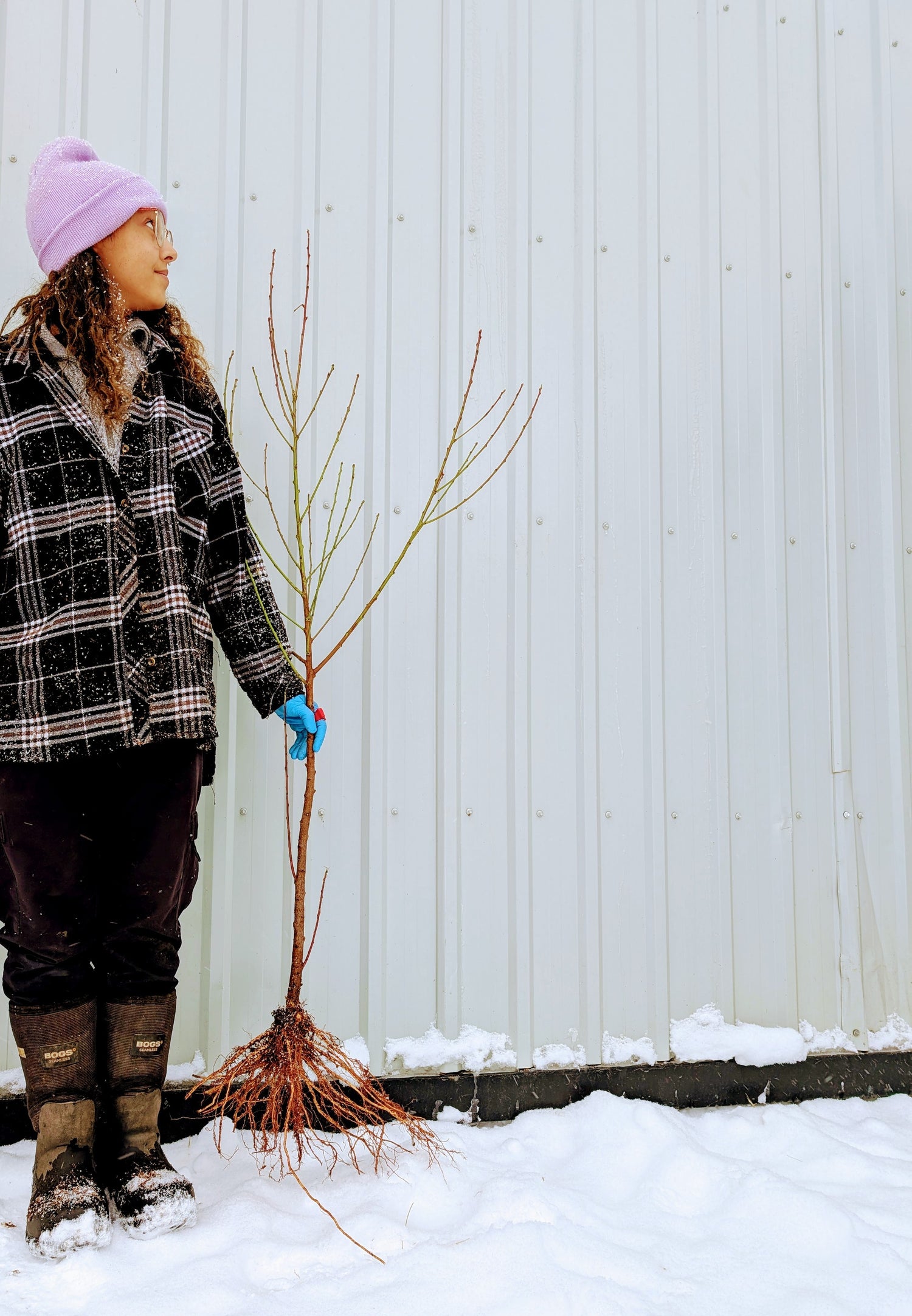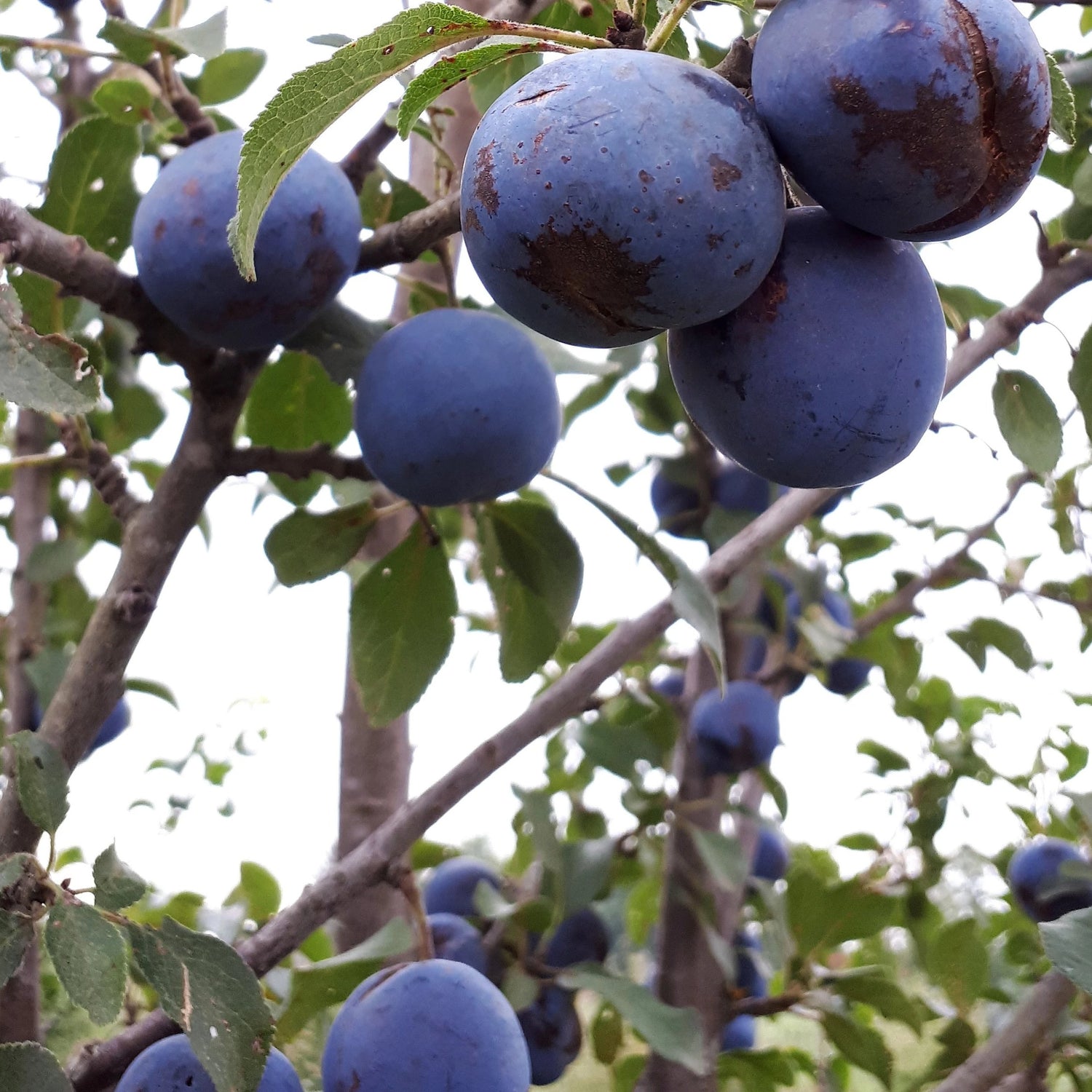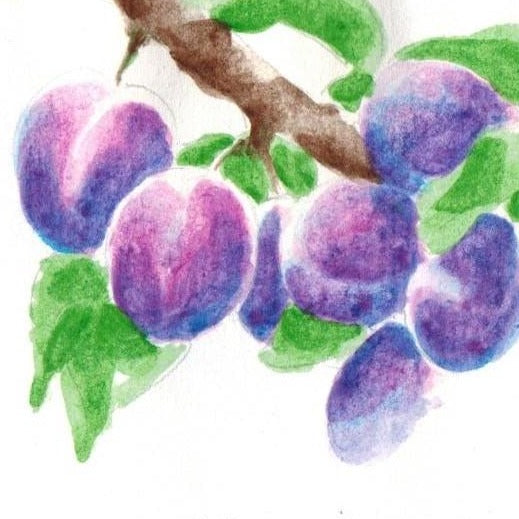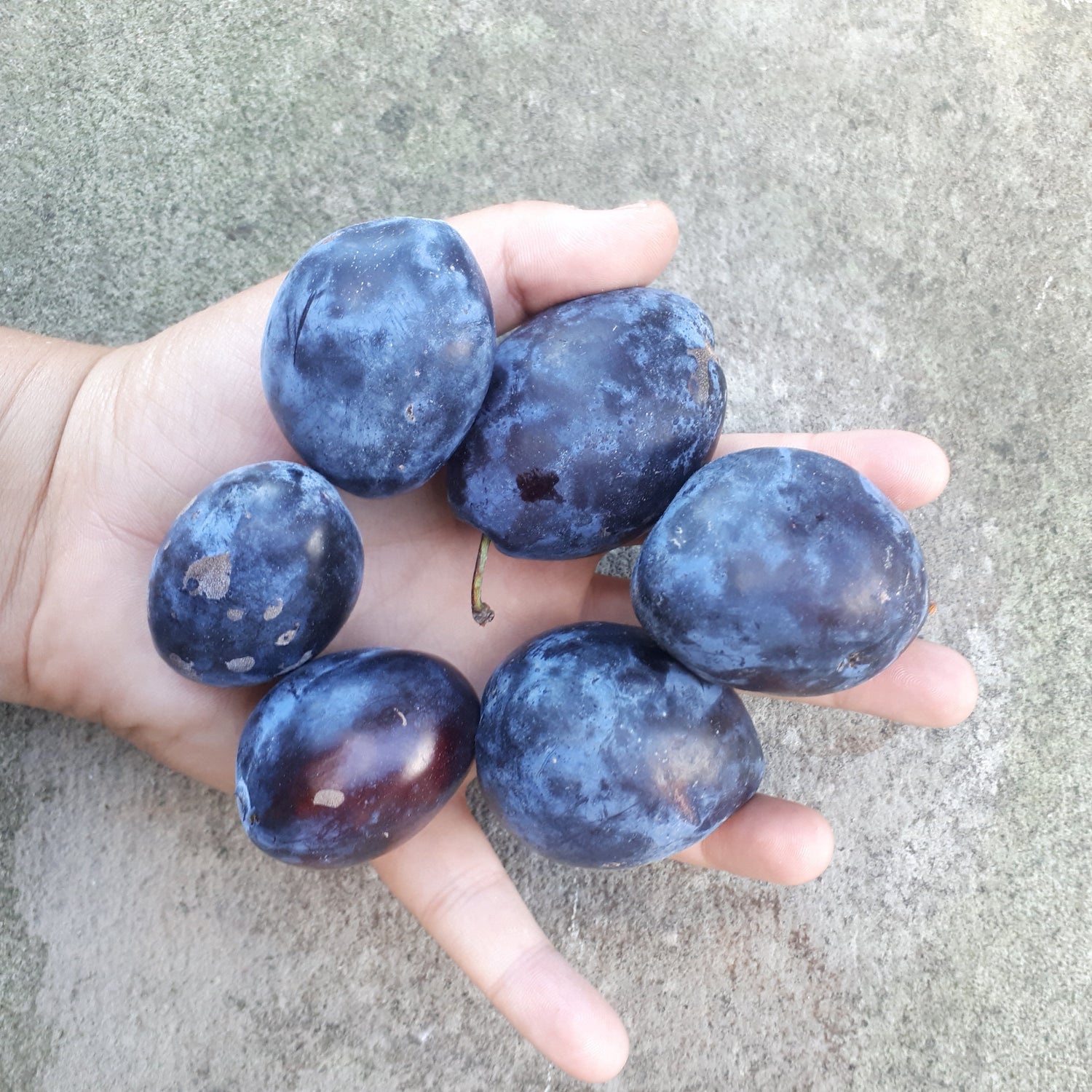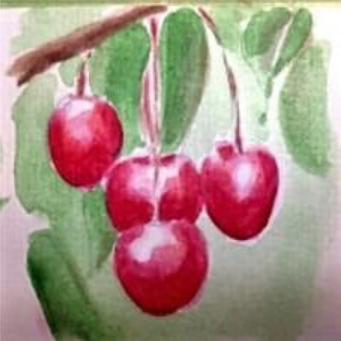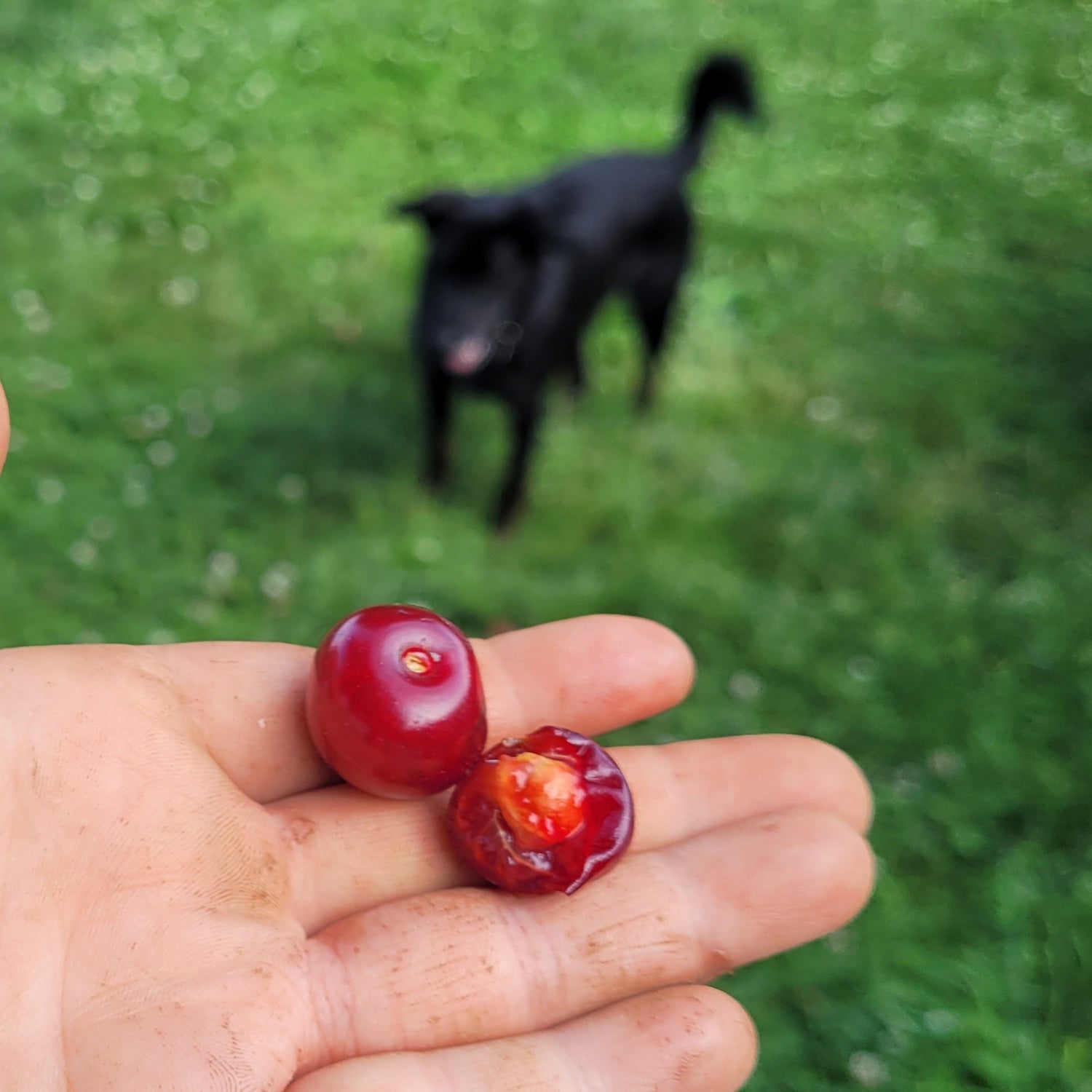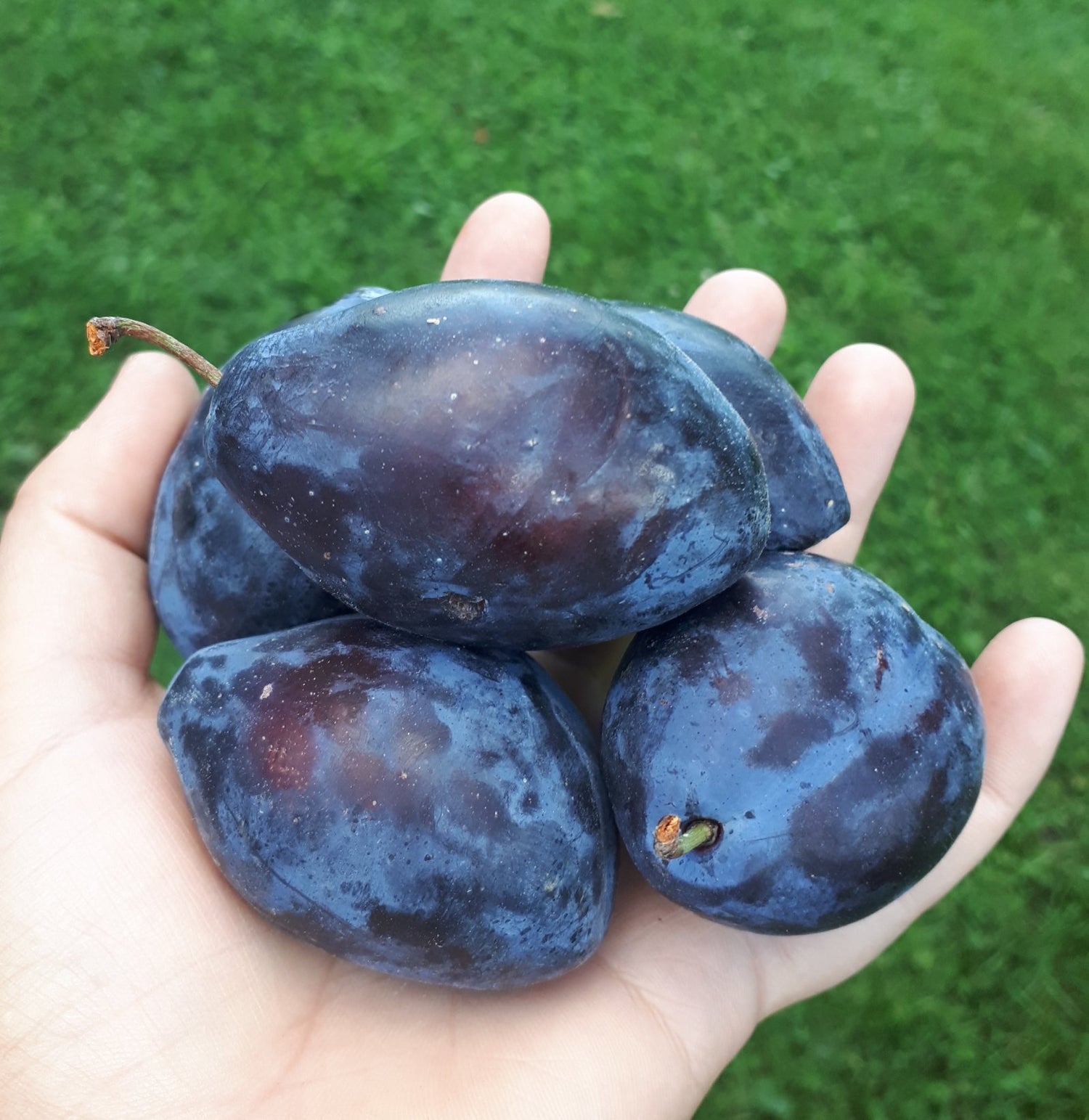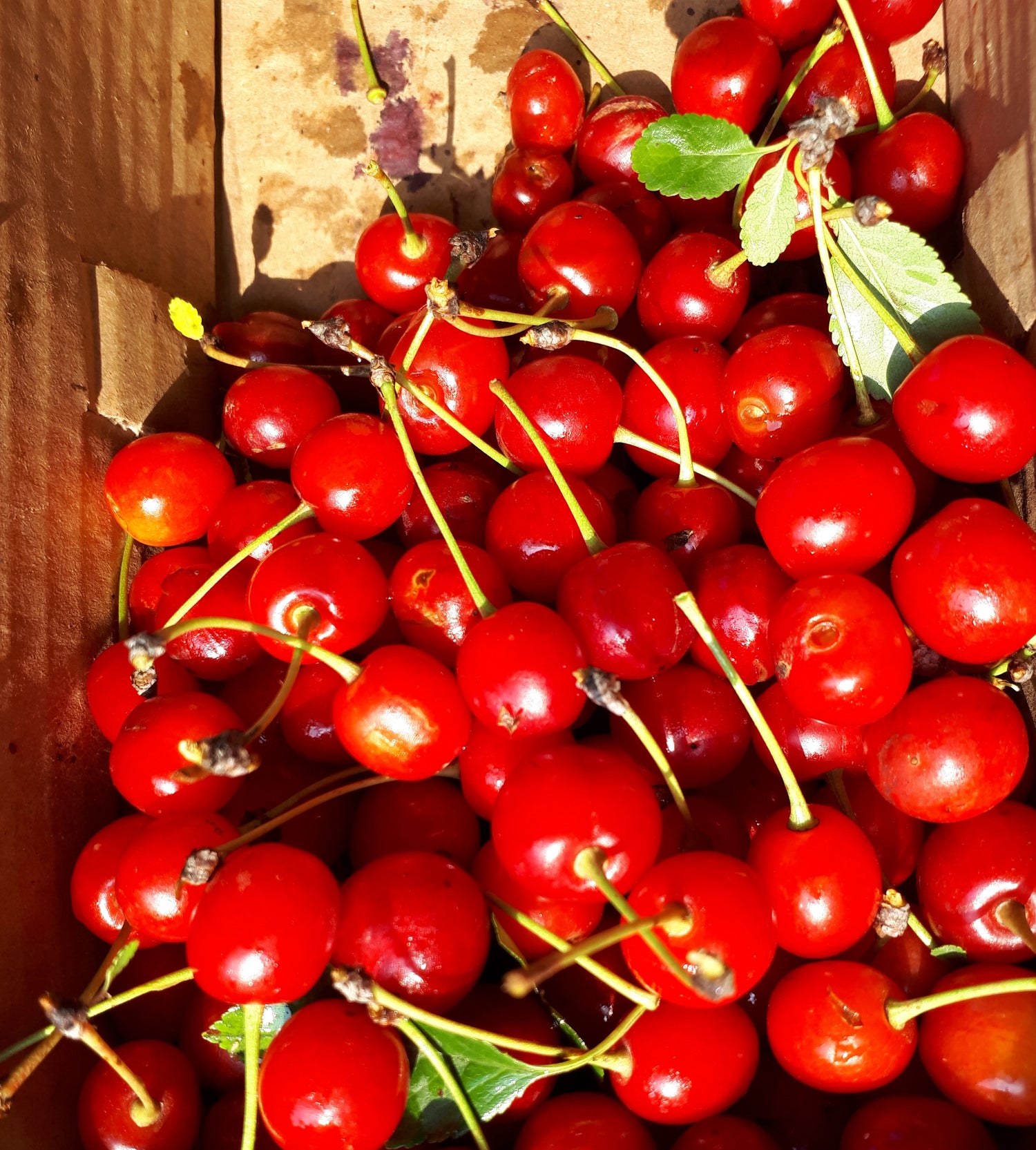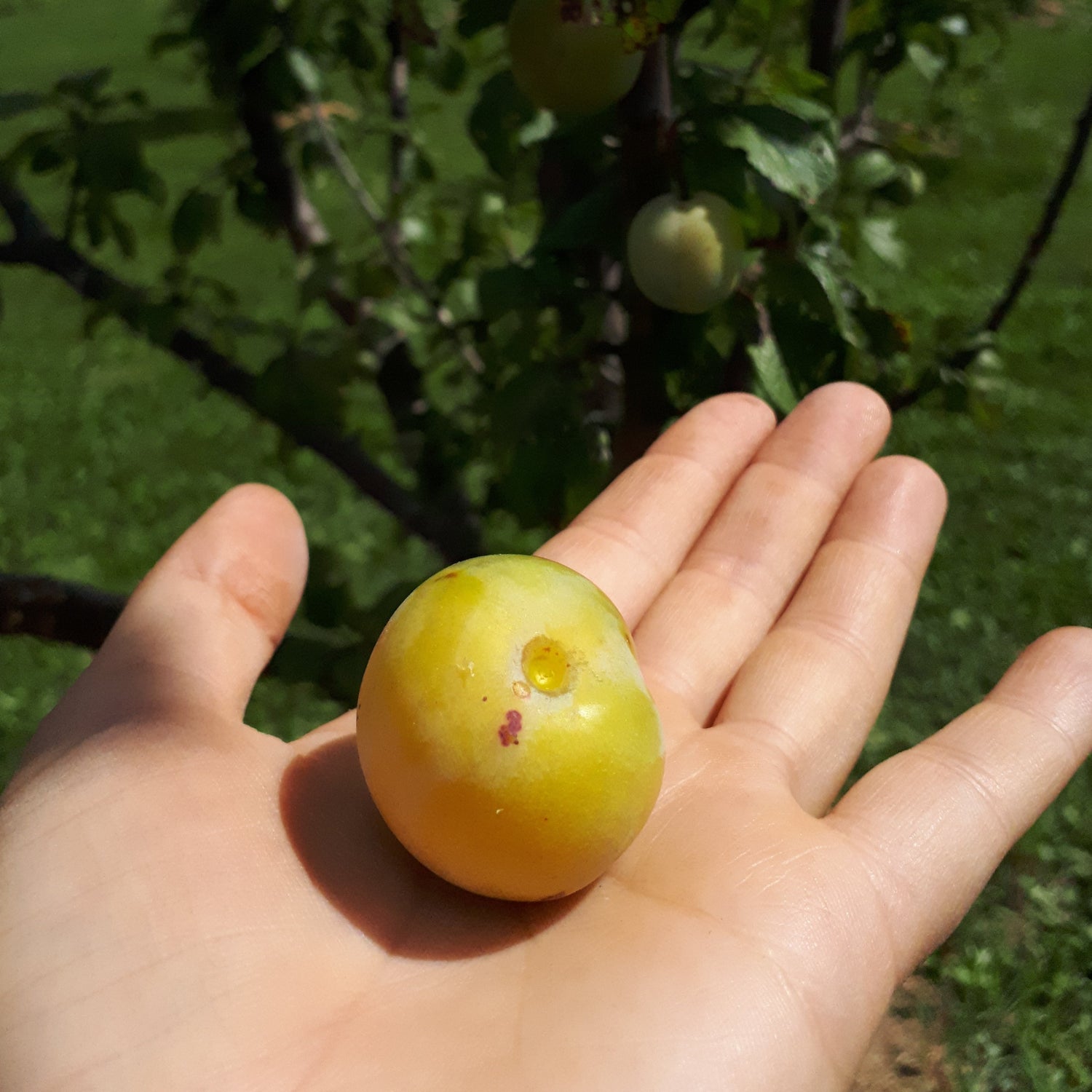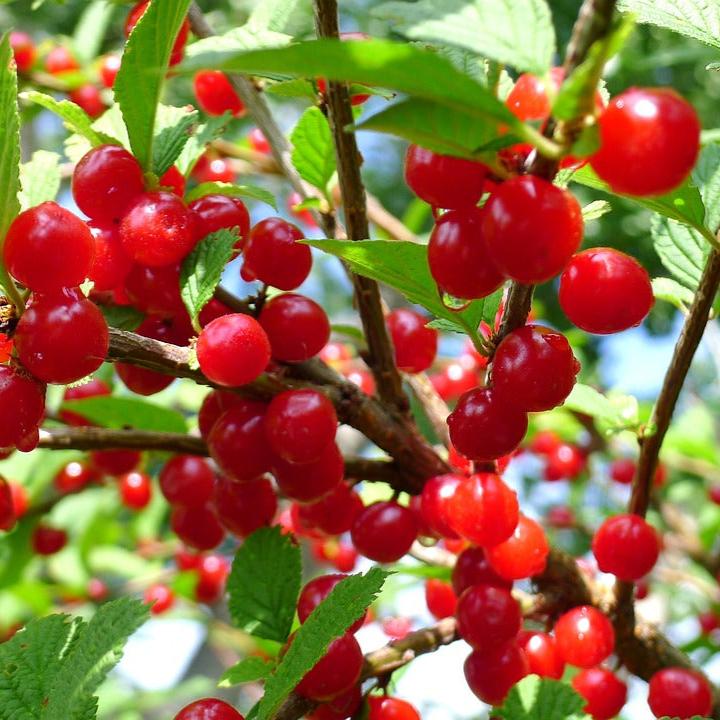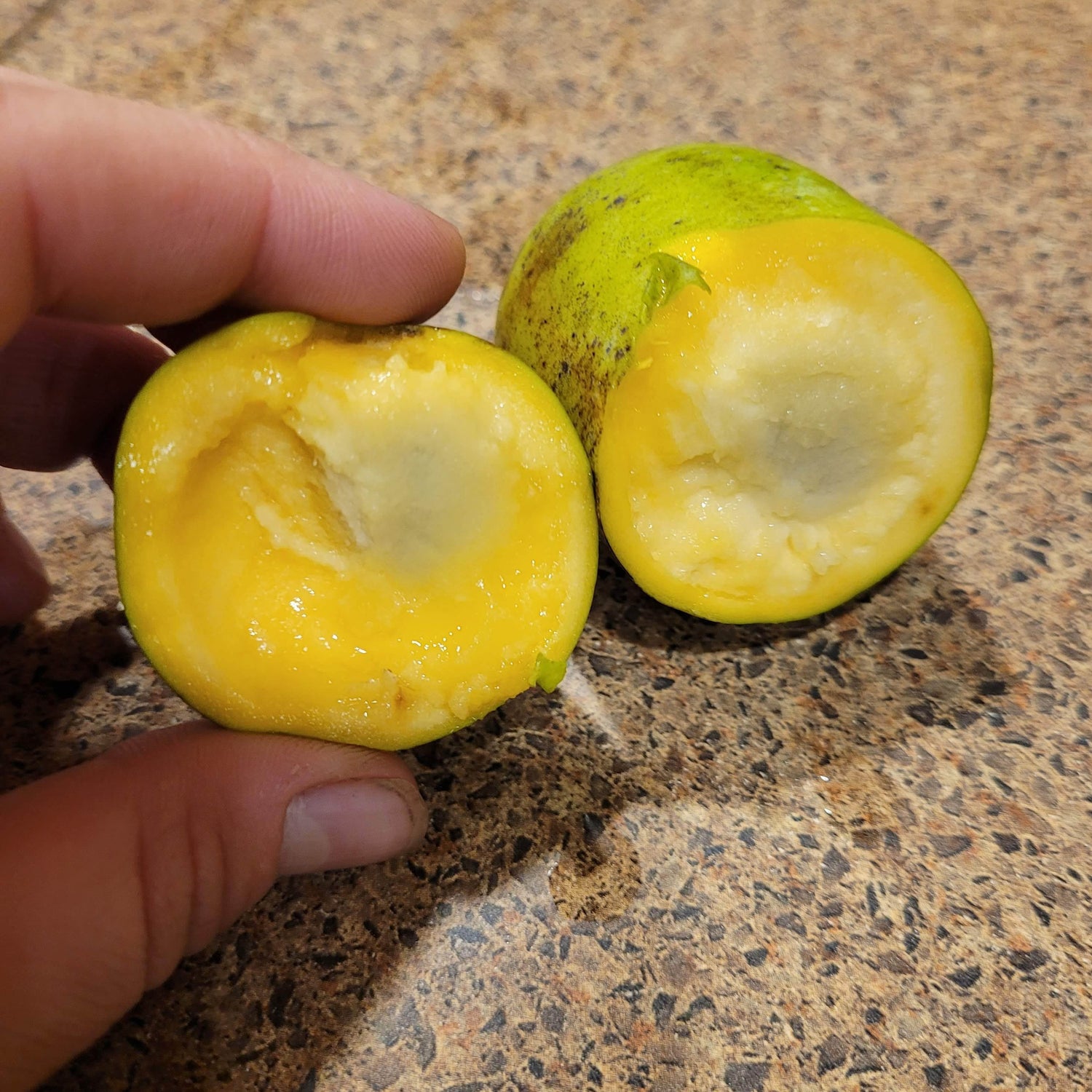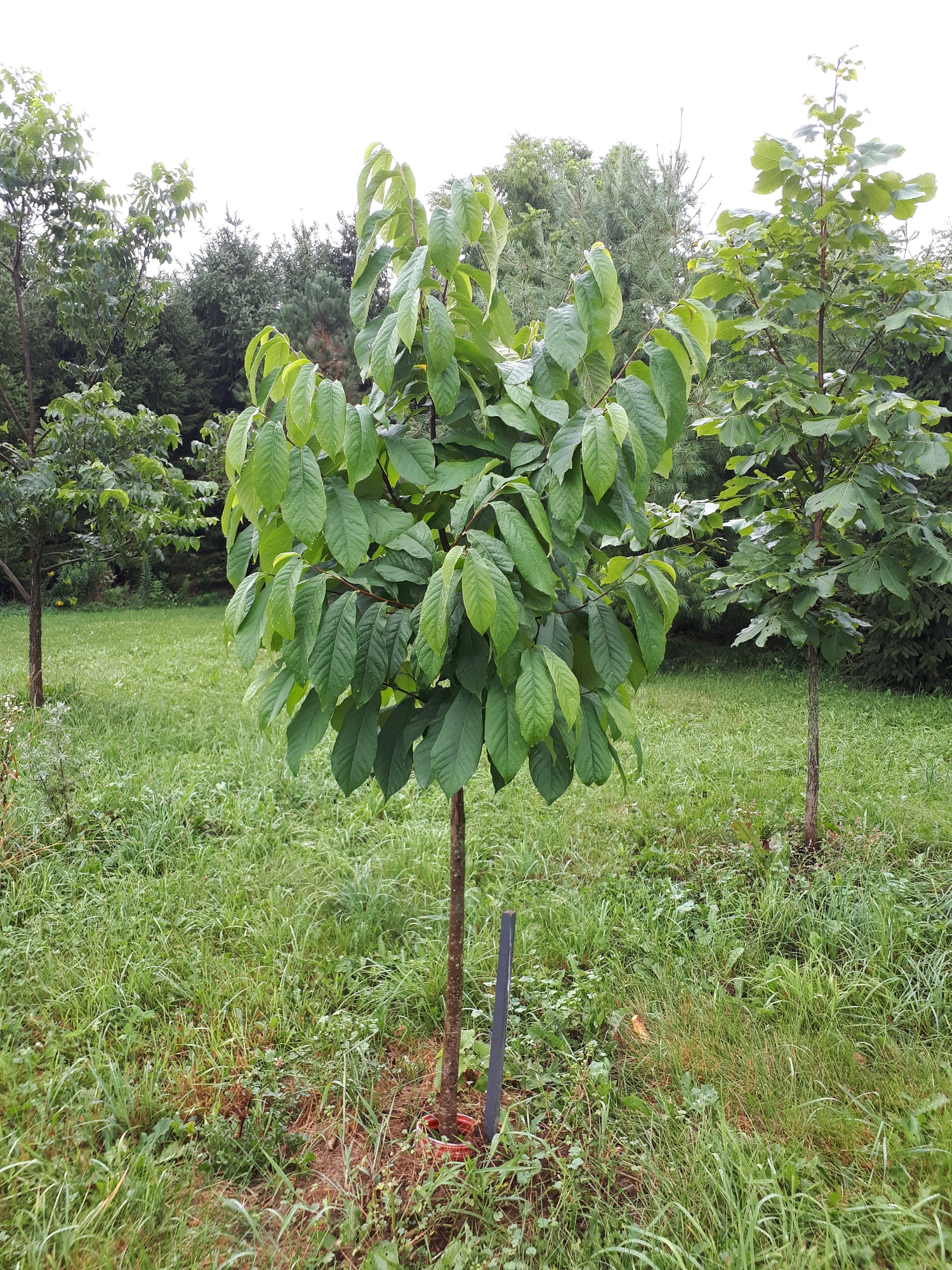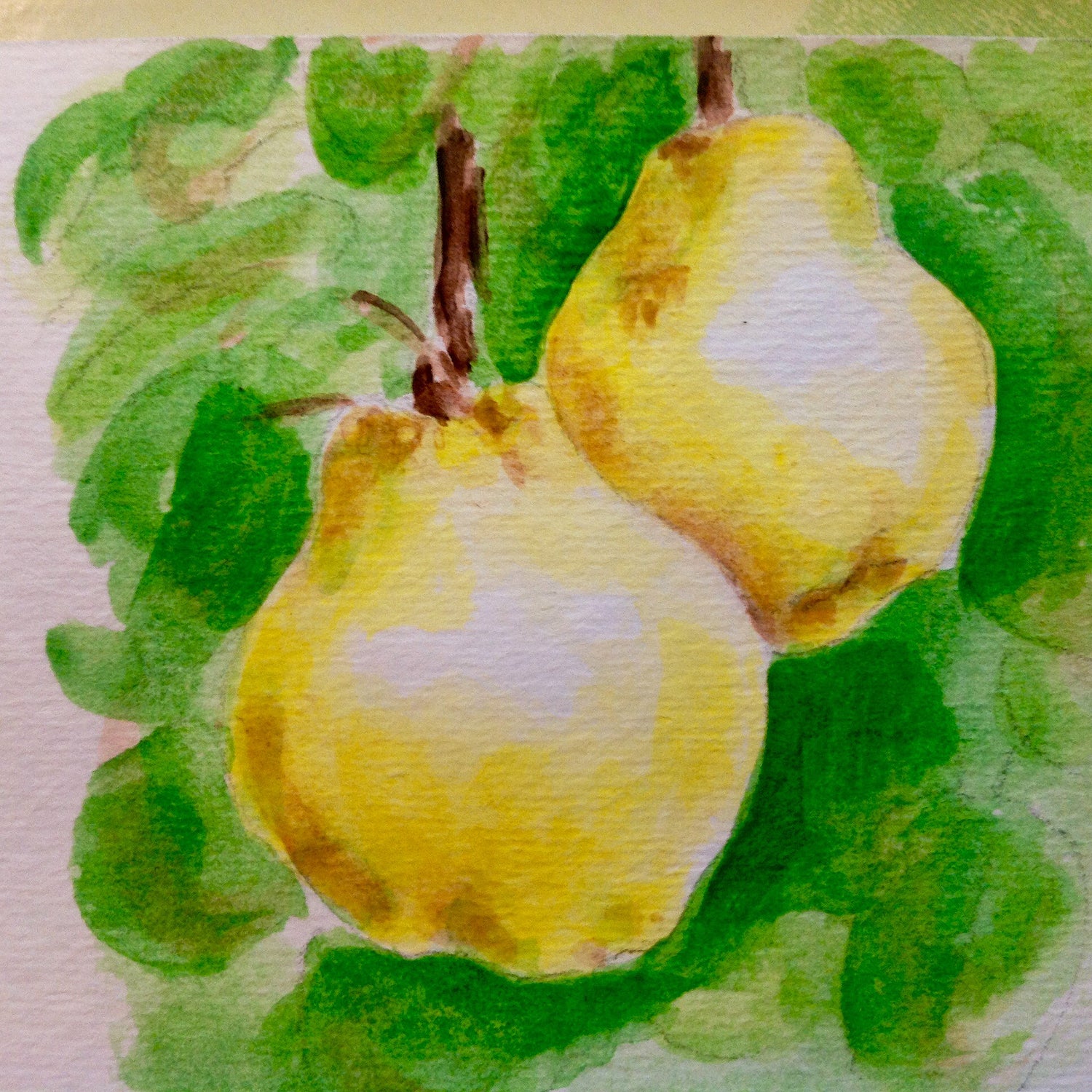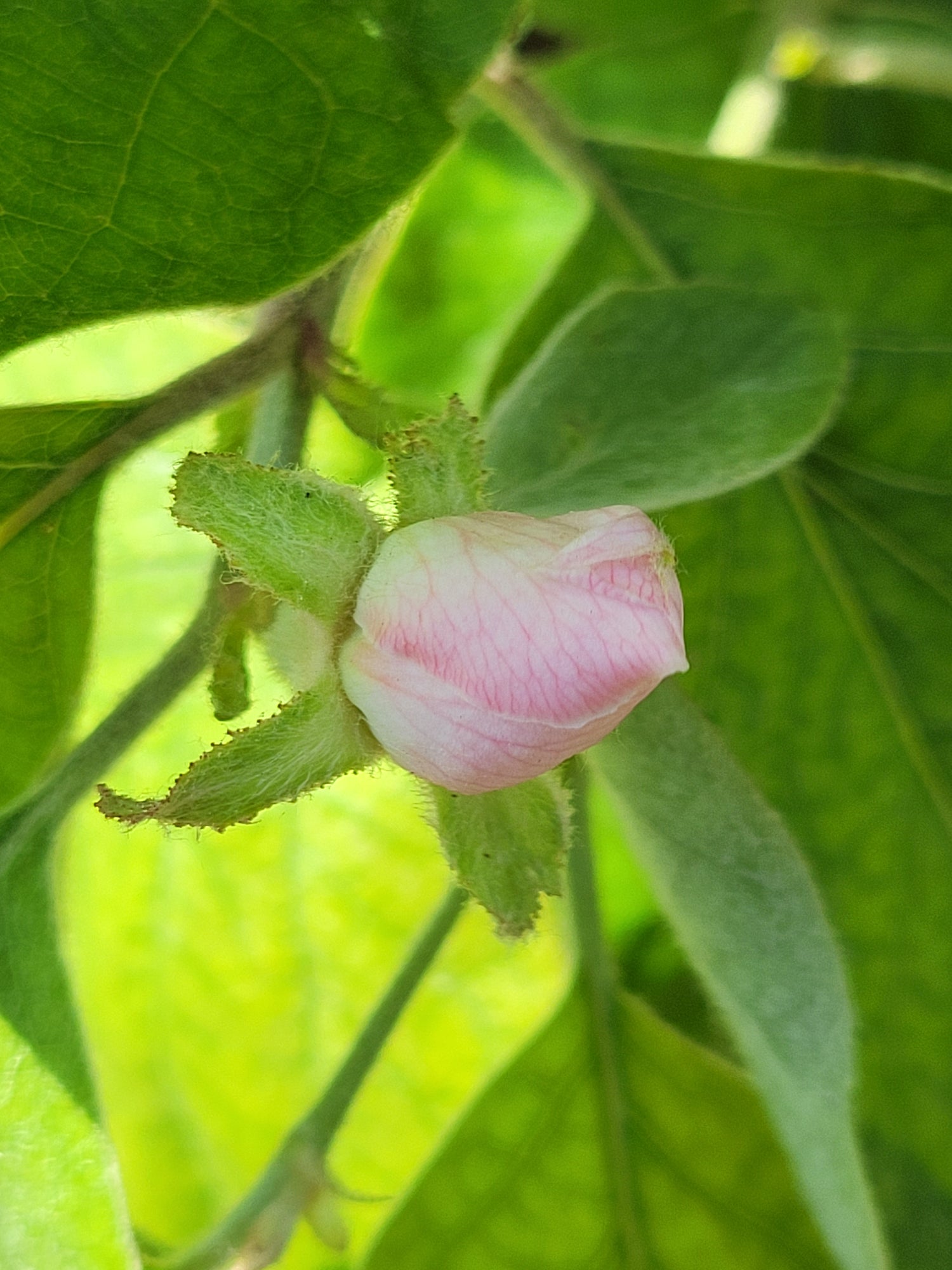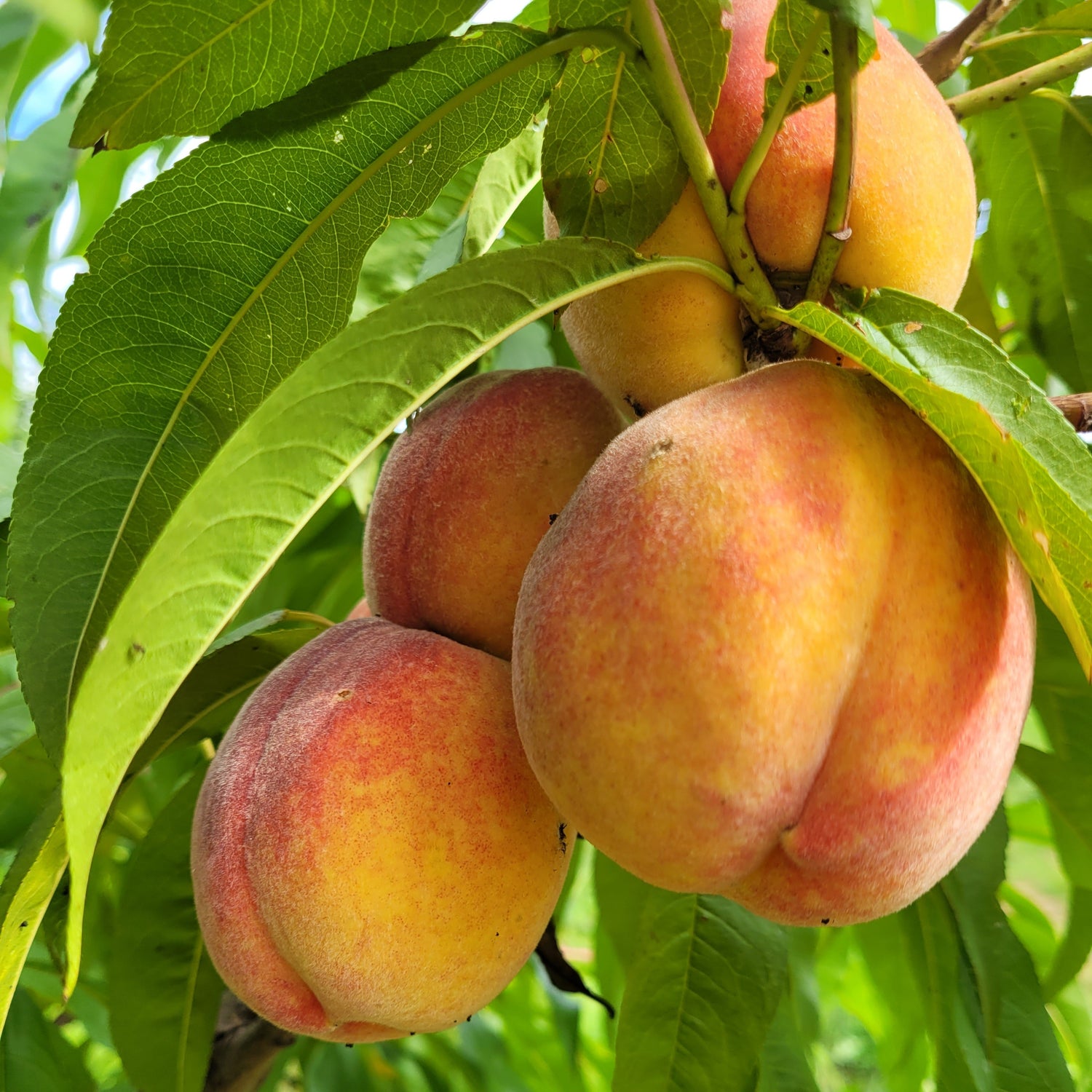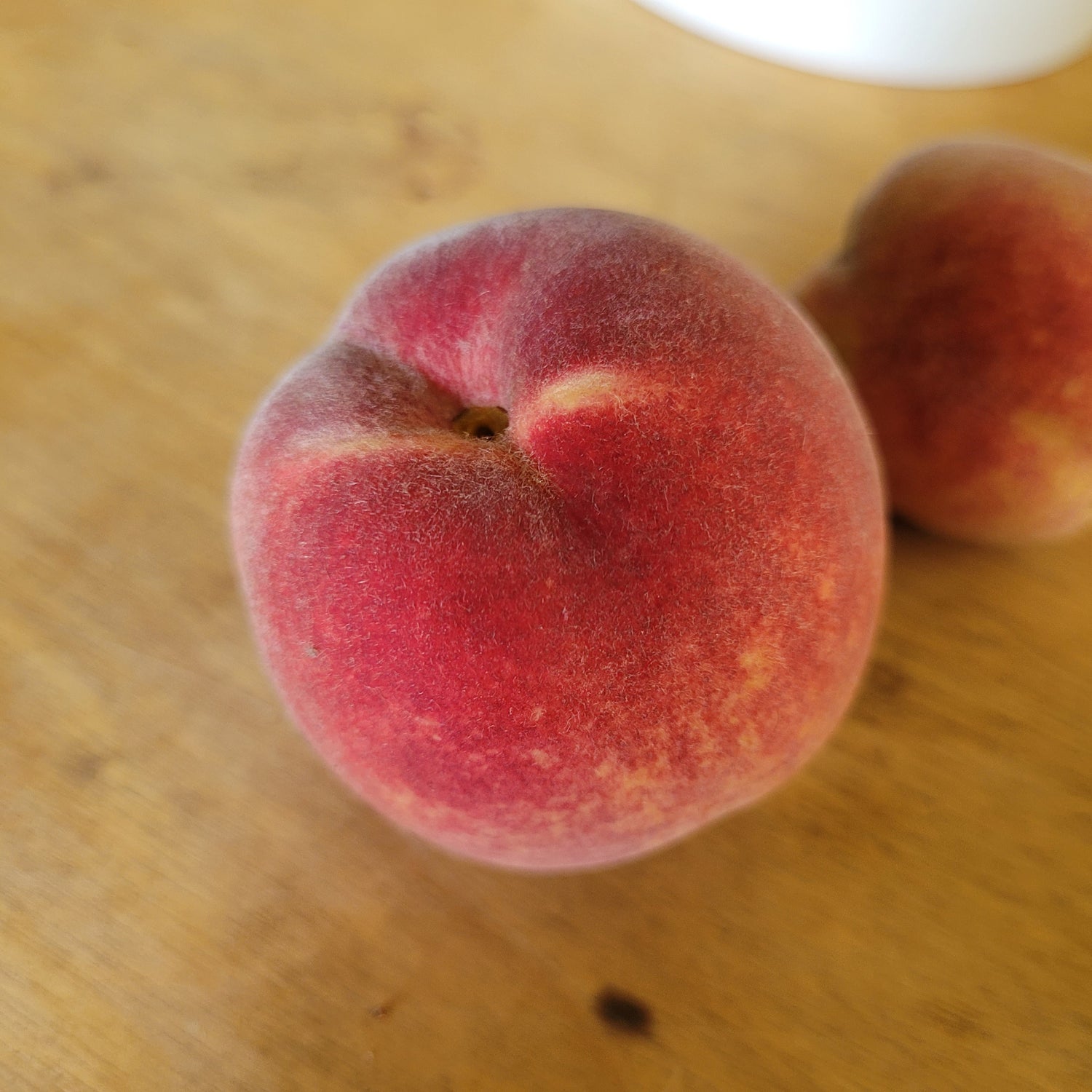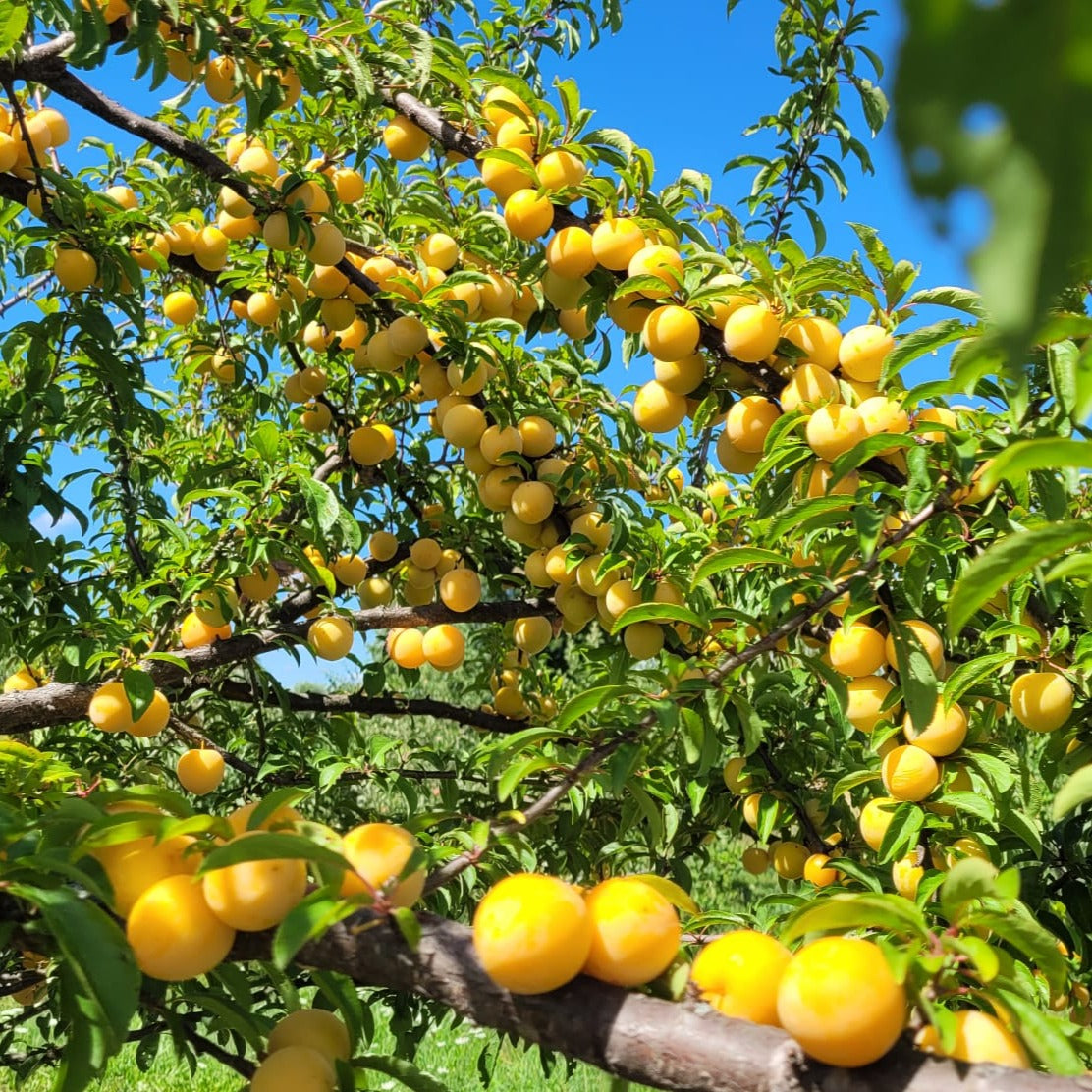Fruit Tree Seedlings (ungrafted)
Let's get a little more diverse! We are happy to see a growing interest in folks growing seedlings! They are an excellent way to increase diversity for both nature and your palate!
Seedling fruits may share some characteristics with their mother plant but there will be natural variation creating a unique plant with every seed, as unique as the differences between you and me. Remember when planting seedlings it's best to plant a few (2-3) for pollination. They typically take longer to come into bearing compared to grafted stock too.
Some species (eg. Prunus) stay fairly close to their mother tree, while others (eg. Malus) will be vary significantly.
Sort by:
24 products
24 products
Species: Diospyros virginiana
History: Native to the southeastern and central areas of the United States, American Persimmon has had a long history of cultivation. The word 'persimmon' is an Anglicized version of the words 'putchamin,' 'pasiminan,' or 'pessamin,' which all mean 'dried fruit' in various Algonquin dialects, reflecting the fruits' usage. It is also common in southern states to trick the unwary into eating the unripe fruit which has an incredibly astringent flavour. Other historical uses for the American Persimmon include turning the seeds into buttons during the American Civil War and using the wood to make items such as pool cues and golf clubs.
Why We Grow It: This unique fruit tree produces a succulently sweet orange fruit that must be extremely ripe before you can eat it. Although it ripens in the summer, the fruit can withstand freezing and hang onto the tree until December. The fruit can be used to make a variety of sweet and savoury dishes and are also very popular among wildlife. Steph has found them great for baking into sweets such as tarts or the pecan and persimmon cookies pictured here!
Pictured is a cookie made with our own American persimmons and pecans!
Species: Prunus armeniaca
History: These seedlings are grown from local Ontario apricot seeds we collected.
Why We Grow It: We are always happy to promote greater biodiversity and growing your own seedlings is a great way to get something unique! Apricots tend to stay fairly true to type so odds are the resulting fruit will be good for fresh eating. After seven years or so, the first of our seedlings have fruited and the fruit is excellent!
If you prefer the certainty of named varieties, these seedlings would also be good for feeding wildlife or planting along fence lines.
Species: Prunus persica
History: These seedlings are grown from Coralstar seeds collected from mother trees growing in Ontario. Coralstar was developed through the Fruit Acres Stellar Peach Breeding Program.
Why We Grow It: Seedling fruit trees are a great way to add some diversity and mystery to your garden or orchard! We expect that seedling peaches will be even hardier trees than their parents! The parent variety, Coralstar, is hardy and great for fresh eating and canning.
Please Note: Since peaches tend to stay true to type more than apples, these seedlings will likely bear a strong resemblance to their parent variety. However, any specific information listed on this page should be taken with a grain of salt as there may be some variation from the parent tree.
Species: Prunus sp
History: These seedlings are grown from Damson plum seeds collected from our orchard. Damson is a plum that may stem from antiquity!
Why We Grow It: Seedling fruit trees are a great way to add some diversity and mystery to your garden or orchard! The parent variety, Damson, produces small blue fruit that are sweet and a little spiced. They are suitable for fresh eating and great for jams, preserves, etc. For a more detailed description, see the Damson page on our website here.
Please Note: Since plums tend to stay true to type more than apples, these seedlings will likely bear a strong resemblance to their parent variety. However, any specific information listed on this page should be taken with a grain of salt as there may be some variation from the parent tree.
Species: Prunus sp
History: These seedlings are grown from plum seeds collected from our orchard. We missed labelling this particular batch, but we know their parents are a blue prune plum similar to German and Late Italian plums.
Why We Grow It: Seedling fruit trees are a great way to add some diversity and mystery to your garden or orchard! The seedling of a classic prune plume like German or Late Italian, these plums will be good for fresh eating but great for baking, drying, etc.
Please Note: Since plums tend to stay true to type more than apples, these seedlings will likely bear a strong resemblance to their parent variety. However, any specific information listed on this page should be taken with a grain of salt as there may be some variation from the parent tree.
Species: Prunus sp
History: These seedlings are grown from German plum seeds collected from our orchard. Likely a few centuries old, German plums are a classic prune style plum that are great for traditional German desserts.
Why We Grow It: Seedling fruit trees are a great way to add some diversity and mystery to your garden or orchard! The parent of this variety, German plum, is sweet and aromatic. It is good for eating fresh and great for drying or baking. For a more detailed description, see the German plum page on our website here.
Please Note: Since plums tend to stay true to type more than apples, these seedlings will likely bear a strong resemblance to their parent variety. However, any specific information listed on this page should be taken with a grain of salt as there may be some variation from the parent tree.
Species: Morus sp
History: Grandpa Harold mulberries are named in memory of Steph's grandfather, whose property houses the mulberry tree we collected these cuttings from. The tree came from Steph's father, who collected mulberry seeds from a tree near Hawkesville and gave one of the resulting seedlings to Grandpa Harold. The tree has provided ample fruit for years and now delights Grandpa Harold's great-grandchildren. The cuttings were taken out of sentimental value as the property where it is growing may be sold in the future.
Why We Grow It: Overall Grandpa Harold is a fairly standard mulberry, producing delightfully sweet berries that are great for fresh eating and baking, but its special sentimental value makes it taste that much sweeter.
Species: Prunus persica
History: These seedlings are grown from Harson peach seeds collected from mother trees growing in Ontario. Harson was developed at the AAFC Harrow Research and Development Centre in Ontario and released in 1982.
Why We Grow It: Seedling fruit trees are a great way to add some diversity and mystery to your garden or orchard! We expect that seedling peaches will be even hardier trees than their parents! Harson produces a freestone peach that is great for fresh eating and canning. It is quite similar to Redhaven.
Please Note: Since peaches tend to stay true to type more than apples, these seedlings will likely bear a strong resemblance to their parent variety. However, any specific information listed on this page should be taken with a grain of salt as there may be some variation from the parent tree.
Species: Prunus avium
History: These seedlings are grown from Hedelfingen seeds from sweet cherries sourced in Ontario. First discovered in Germany in 1850, Hedelfingen has become a popular variety in Ontario.
Why We Grow It: Seedling fruit trees are a great way to add some diversity and mystery to your garden or orchard! The parent variety, Hedelfingen, is well-regarded due to its great flavour and later bloom time which makes it more tolerant of late spring frosts.
Please Note: Since sweet cherries tend to stay true to type more than apples, these seedlings will likely bear a strong resemblance to their parent variety. However, any specific information listed on this page should be taken with a grain of salt as there may be some variation from the parent tree.
Species: Prunus cerasus
History: These sour cherry seedlings are grown from Juliet seeds we've collected here at Silver Creek Nursery from our own trees! Juliet, is one of the members of the Romance Series released in 2004 from the University of Saskatchewan.
Why We Grow It: Seedling fruit trees are a great way to add some diversity and mystery to your garden or orchard! The parent variety, Juliet, has a sweet/tart flavour that some enjoy for fresh eating and is great for processing. A naturally dwarfing and bush-like variety. For a full description, see our Juliet page here.
Please Note: Since sour cherries tend to stay true to type more than apples, these seedlings will likely bear a strong resemblance to their parent variety. However, any specific information listed on this page should be taken with a grain of salt as there may be some variation from the parent tree.
Species: Prunus sp
History: These seedlings are grown from Late Italian plum seeds collected from our orchard. Late Italian is a traditional prune variety and is still commonly grown in Europe and North America today.
Why We Grow It: Seedling fruit trees are a great way to add some diversity and mystery to your garden or orchard! The parent variety, Late Italian, produces an all-purpose plum that is excellent for drying and great eaten fresh, canned, or incorporated into baking, desserts, or salads. For a more detailed description, see the Late Italian page on our website here.
Please Note: Since plums tend to stay true to type more than apples, these seedlings will likely bear a strong resemblance to their parent variety. However, any specific information listed on this page should be taken with a grain of salt as there may be some variation from the parent tree.
Species: Prunus sp
History: These seedlings are grown from Lombard plum seeds. The parent variety, Lombard, originated in the US in the 1800s.
Why We Grow It: Seedling fruit trees are a great way to add some diversity and mystery to your garden or orchard! Lombard is decent for fresh eating and good for canning and cooking.
Please Note: Since plums tend to stay true to type more than apples, these seedlings will likely bear a strong resemblance to their parent variety. However, any specific information listed on this page should be taken with a grain of salt as there may be some variation from the parent tree.
Species: Prunus cerasus
History: These Meteor seedlings are grown from seeds we've collected here at Silver Creek Nursery from our own trees! Meteor was introduced from the University of Minnesota in 1952.
Why We Grow It: Seedling fruit trees are a great way to add some diversity and mystery to your garden or orchard! The parent variety, Meteor, is a reliable, hardy variety that is great for pies. They naturally have a more compact growth habit. For a full description, see our Meteor page here.
Please Note: Since sour cherries tend to stay true to type more than apples, these seedlings will likely bear a strong resemblance to their parent variety. However, any specific information listed on this page should be taken with a grain of salt as there may be some variation from the parent tree.
Species: Prunus sp
History: These seedlings are grown from Mirabelle plum seeds collected from our orchard. Mirabelle has been grown in Europe for a long time and remains popular there, especially in France.
Why We Grow It: Seedling fruit trees are a great way to add some diversity and mystery to your garden or orchard! The parent variety, Mirabelle, is super sweet and flavourful. For a more detailed description, see the Mirabelle plum page on our website here.
Please Note: Since plums tend to stay true to type more than apples, these seedlings will likely bear a strong resemblance to their parent variety. However, any specific information listed on this page should be taken with a grain of salt as there may be some variation from the parent tree.
Species: Prunus persica
History: These peach seedlings are grown from peach seeds from the very trees we have in our orchards! The parents will be a mix of the Harrow Diamond, Redhaven, Reliance, Veteran, and seedling peaches from True Root Nursery.
Why We Grow It: Peach seedlings tend to stay fairly true to type so odds are you're going to get a pretty solid peach tree once they mature and it is hoped that growing them from seed here will make them a littler hardier! For those who prefer the certainty that comes with getting a named variety, these trees would also be great for grafting as rootstock, feeding wildlife, or planting along a fence line.
Species: Morus sp
History: Our mulberry seedlings are grown from local seed, but they most closely resemble the native red mulberry, Morus rubra, which are considered endangered in Canada. Indigenous peoples traditionally use the berries as a food source, the wood for smoking meat, and even made clothes from the inner bark of the young plants.
Why We Grow It: The delectably sweet berries are easily enjoyed by humans, livestock, and insects alike! Mulberries don't last very long once ripe so the best way to enjoy this summer treat is to grow them yourself!
Species: Prunus tomentosa
History: Nanking cherry is native to parts of China, Tibet, Korea, and Mongolia, and possibly northern India. It has long been cultivated in Asia for its tart fruit which is used in pickling, making wine, juice, and jam, and as an ornamental plant. It was introduced to Britain in 1870 and the US in 1892 where it is also planted in hedgerows as a windbreak. Breeding programs in the US, Canada, and Russia began in the 1920s to make the fruit more palatable fresh but by the 1940s interest had unfortunately waned.
Why We Grow It: Although more closely related to plums than cherries, Nanking cherry is great for a variety of uses including wine, juice, jam, and as an ornamental plant thanks to their attractive pinkish-white blossoms. Some enjoy eating the tart fruit fresh as well and they are also popular with birds and wildlife. Nanking cherries are hardy and tolerant of quite cold weather, making them an excellent option for most parts of Canada.
Species: Asimina triloba
History: Native to southern Ontario where it is considered a vulnerable species and the central United States, it is believed the range of these trees has shrunk with the extinction of megafauna that likely dispersed the seeds. These oddly tropical fruits have been cultivated by indigenous peoples and European colonizers alike, it is rumoured chilled pawpaw was George Washington's favourite dessert and Thomas Jefferson planted some at Monticello. Although popular among locals and with foragers, pawpaws have failed to achieve any kind of commercial success due to their poor keeping ability and oft difficult pollination.
Why We Grow It: The Pawpaw produces very unique fruit that has a distinct tropical banana/mango flavour and custard-like texture. As it oxidizes fairly quickly once cut open, it is best eaten fresh once fully ripe or made into sauces, ice cream, etc. You can bake and cook with pawpaw like you would with bananas but please take note that some people have reported extreme tummy troubles after consuming cooked pawpaws! Mouse made a no-bake pawpaw cheesecake (pictured on the left), you can find the recipe on our blog here! Pawpaws have a very slow growth habit and grow naturally as an under story tree, usually not reaching over 35 feet. We grow them from seed for increased hardiness compared to grafted stock.
Species: Cydonia oblonga
History: The seedlings were sprouted from seeds sourced from Ontario.
Why We Grow It: By growing quince from seeds in our area, we hope these seedlings will be a little more cold hardy. Like all quince, the fruit from your seedlings are best used for cooking, baking, and preserving since the intense, tart flavour is a bit much when eaten fresh.
We have seedlings of the following varieties:
- Ernie's Favourite - A favourite from a homestead in Mt. Pleasant that has produced fruit for decades. It performs well in our climate.
- Quince Seedling - The seedlings were sprouted from seeds sourced from an old mother tree on a local farm. The previous owners have enjoyed the fruit for generations, proving that this is a nice, reliable variety.
Species: Prunus persica
History: These seedlings are grown from Redhaven peach seeds collected from mother trees growing in Ontario. Redhaven was released from Michigan State University in the 1940s and has remained one of the most popular peach varieties in the world.
Why We Grow It: Seedling fruit trees are a great way to add some diversity and mystery to your garden or orchard! We expect that seedling peaches will be even hardier trees than their parents! Redhaven has a stellar reputation due to its excellent flavour and attractive red skin. See our Redhaven product page here for more information.
Please Note: Since peaches tend to stay true to type more than apples, these seedlings will likely bear a strong resemblance to their parent variety. However, any specific information listed on this page should be taken with a grain of salt as there may be some variation from the parent tree.
Species: Prunus persica
History: These seedlings are grown from Reliance peach seeds collected from mother trees growing in Ontario. Reliance peaches were developed in a breeding program at the Agricultural Extension Station in New Hampshire and released in 1964.
Why We Grow It: Seedling fruit trees are a great way to add some diversity and mystery to your garden or orchard! We expect that seedling peaches will be even hardier trees than their parents! The parent variety, Reliance, is a cold hardy variety perfect for Canadian growers. The fruit tastes great and can be eaten fresh or used in baking and preserves.
Please Note: Since peaches tend to stay true to type more than apples, these seedlings will likely bear a strong resemblance to their parent variety. However, any specific information listed on this page should be taken with a grain of salt as there may be some variation from the parent tree.
Species: Prunus avium
History: These seedlings are grown from seeds from Sandra Rose sweet cherries sourced in Ontario. Sandra Rose was developed at the Summerland Research and Development Centre in BC.
Why We Grow It: Seedling fruit trees are a great way to add some diversity and mystery to your garden or orchard! Sandra Rose, the parent variety, produces large dark cherries with excellent flavour.
Please Note: Since sweet cherries tend to stay true to type more than apples, these seedlings will likely bear a strong resemblance to their parent variety. However, any specific information listed on this page should be taken with a grain of salt as there may be some variation from the parent tree.
Species: Hippophae rhamnoides
History: Sea buckthorn is native to parts of Europe and Asia where it has been a source of food, medicine, and fodder for centuries. These seedlings were grown by us so it will be a bit of a surprise to see what the mature plants are like!
Why We Grow It: If you're looking for a dense, fruiting bush, look no further! These cold-hardy plants are grown from seed, and unlike cultivated varieties it is uncertain whether each seedling is male or female. The nodules on their roots help fix nitrogen into the soil, and the resilient plants are salt tolerant. They can withstand the juglones from walnuts and will reach up to 6 meters tall, forming virtually impermeable thickets if left to their own devices. The berries have a wide range of uses and the leaves can be enjoyed in tea.
Species: Prunus sp
History: These seedlings are grown from Shiro plum seeds collected from our orchard and a Niagara orchard. Shiro plums (translated from Japanese as 'white') were developed in California and introduced in 1899.
Why We Grow It: Seedling fruit trees are a great way to add some diversity and mystery to your garden or orchard! The parent variety, Shiro, has yellow skin and flesh that is juicy and sweet.
Please Note: Since plums tend to stay true to type more than apples, these seedlings will likely bear a strong resemblance to their parent variety. However, any specific information listed on this page should be taken with a grain of salt as there may be some variation from the parent tree.
